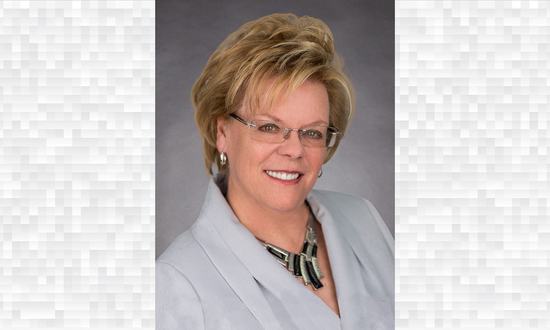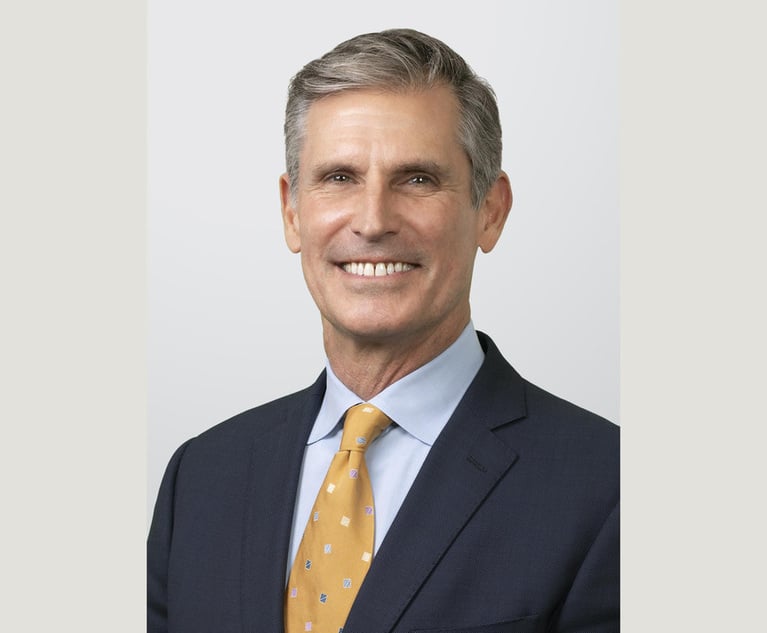Law Firm Leader, Pioneer for Women, Reflects on Her Future, Future of the Profession and March Toward Diversity
Real change will come from clients who see the benefits of diverse legal representation, Law says.
November 21, 2018 at 11:22 AM
5 minute read
 Rhea Law/courtesy photo
Rhea Law/courtesy photo
In December, Rhea Law, a respected Florida attorney and pioneer for women in the legal profession, will step down as the chairwoman of Buchanan Ingersoll & Rooney's Florida operation, drawing down a storied legal career that spanned three decades.
But Law, whose hobbies include piloting airplanes and motor racing, isn't one to retreat into an obscure and peaceful retirement.
Even as she has transitioned to an of counsel role at Buchanan, Law maintains 16 civic and community memberships and leadership positions, including a chair on the Board of Overseers at Stetson University School of Law and a board member at the Tampa Electric Co.
Some are even floating her name around for a possible Tampa mayoral bid (a rumor she finds very funny but says is untrue).
“It's just in my DNA,” Law said of her many activities. “I'm constantly moving, and I'm curious about so many things.”
At this point, she's unsure of what lies in her future, or her “third career” as she calls it. She's interested in the intersection of academic innovation and public policy: how the University of South Florida can become the third rail of Tampa's economy by leveraging its growth and resources to connect with Tampa's business community.
But what would that actually look like? She still does not know.
As for the future of Florida's legal market, Law is bullish, despite warnings from economists that the United States will soon see a recession.
“I feel great about 2019,” she said, a sentiment mirrored by many in Florida's legal community.
Though her particular practice—environmental land use and development—is more exposed to the dangers of an economic downturn, Law isn't too worried. Cycles come and go all the time, she said. It's a reality that has always been baked into her job.
The key for law firms is to make sure they stay nimble by cross-training lawyers and efficiently distributing attorneys across practice areas, she said. As one practice area slows down, another will speed up. A recession may slow down zoning and land use practices, but bankruptcy practices may see an increase.
No retrospective about Law's career can ignore her place as a woman who attained power in law early on. She became one of the most influential women attorneys in Florida, if not the country, when she became CEO and chairwoman of the board of Fowler White Boggs Banker (later changed to Fowler White Boggs) in 2002. And her status was further elevated when Fowler merged with Buchanan in 2014, instantly propelling the firm into the Am Law 200.
Back in the early 2000s, only 8 percent of leadership positions were held by women, she said. Now, women account for about 25 percent of leadership roles. Law says she's felt that shift, though it has come at a glacial pace.
Diversity and inclusion have become buzzwords today, with an innumerable swath of iterations throughout the legal world, from organizations such as the National Association of Women Lawyers (NAWL) to diversity programs within individual firms to even podcasts exploring issues women face in their legal careers.
Today, 65 firms, including Buchanan, have signed on to the Mansfield Rule, a play on the National Football League's so-called Rooney Rule requiring that at least one minority candidate be considered for NFL head coach and general manager positions. Similarly, the Mansfield Rule states that women and minorities must compromise 30 percent of a law firm's candidate pool for any leadership or governance position. The rule is named after Arabella Mansfield, who in 1869 became the first female lawyer in the U.S.
Buchanan itself has a chief diversity and inclusion officer, Heather B. Brock, tasked with leading and developing the firm's diversity initiatives.
“If you don't focus on diversity, it won't happen by accident,” said Law, who is the current chairwoman of Buchanan's diversity committee.
But firms still lag behind their in-house counterparts in the business world, Law notes.
According to a 2017 survey of just under 100 law firms in the Am Law 200 conducted by NAWL, the likelihood that a woman will become an equity partner (19 percent) has climbed just 4 percent in the last decade. Women of color make up 2 percent of equity partners. By comparison, women comprised 31.9 percent of all chief legal officers for Fortune 1000 companies in 2016.
In the end, it's up to individual firms to take advantage of these initiatives designed to spur gender equality. But Law admits that systematic change won't come exclusively on the back of individual pledges. What's going to bring about wholesale change, she said, is a client base that sees the value in diversity.
“The entire industry is only going to move if the clients demand it,” she said.
She points to various studies that show diverse workplaces reap greater economic reward. A 2017 study by McKinsey & Co. found that companies with gender-diverse executives were 21 percent more likely to outperform other firms on profitability. Law believes that as clients themselves become more diverse, and as they realize the economic benefits of diversity, firms that don't value diversity will suffer.
Meanwhile, for women coming up in the legal profession, Law has this advice: Select a practice you love, plan out your success, seek out a mentor and champion, and “never undervalue your capabilities.”
This content has been archived. It is available through our partners, LexisNexis® and Bloomberg Law.
To view this content, please continue to their sites.
Not a Lexis Subscriber?
Subscribe Now
Not a Bloomberg Law Subscriber?
Subscribe Now
NOT FOR REPRINT
© 2025 ALM Global, LLC, All Rights Reserved. Request academic re-use from www.copyright.com. All other uses, submit a request to [email protected]. For more information visit Asset & Logo Licensing.
You Might Like
View All
'None of Us Like It': How Expedited Summer Associate Recruiting Affects Law Students and the Firms Hiring Them

Conversation Catalyst: Transforming Professional Advancement Through Strategic Dialogue
5 minute read
What Happens When Lateral Partners’ Guaranteed Compensation Ends?

Holland & Knight Expands Corporate Practice in Texas With Former Greenberg Traurig Partner
3 minute readTrending Stories
Who Got The Work
J. Brugh Lower of Gibbons has entered an appearance for industrial equipment supplier Devco Corporation in a pending trademark infringement lawsuit. The suit, accusing the defendant of selling knock-off Graco products, was filed Dec. 18 in New Jersey District Court by Rivkin Radler on behalf of Graco Inc. and Graco Minnesota. The case, assigned to U.S. District Judge Zahid N. Quraishi, is 3:24-cv-11294, Graco Inc. et al v. Devco Corporation.
Who Got The Work
Rebecca Maller-Stein and Kent A. Yalowitz of Arnold & Porter Kaye Scholer have entered their appearances for Hanaco Venture Capital and its executives, Lior Prosor and David Frankel, in a pending securities lawsuit. The action, filed on Dec. 24 in New York Southern District Court by Zell, Aron & Co. on behalf of Goldeneye Advisors, accuses the defendants of negligently and fraudulently managing the plaintiff's $1 million investment. The case, assigned to U.S. District Judge Vernon S. Broderick, is 1:24-cv-09918, Goldeneye Advisors, LLC v. Hanaco Venture Capital, Ltd. et al.
Who Got The Work
Attorneys from A&O Shearman has stepped in as defense counsel for Toronto-Dominion Bank and other defendants in a pending securities class action. The suit, filed Dec. 11 in New York Southern District Court by Bleichmar Fonti & Auld, accuses the defendants of concealing the bank's 'pervasive' deficiencies in regards to its compliance with the Bank Secrecy Act and the quality of its anti-money laundering controls. The case, assigned to U.S. District Judge Arun Subramanian, is 1:24-cv-09445, Gonzalez v. The Toronto-Dominion Bank et al.
Who Got The Work
Crown Castle International, a Pennsylvania company providing shared communications infrastructure, has turned to Luke D. Wolf of Gordon Rees Scully Mansukhani to fend off a pending breach-of-contract lawsuit. The court action, filed Nov. 25 in Michigan Eastern District Court by Hooper Hathaway PC on behalf of The Town Residences LLC, accuses Crown Castle of failing to transfer approximately $30,000 in utility payments from T-Mobile in breach of a roof-top lease and assignment agreement. The case, assigned to U.S. District Judge Susan K. Declercq, is 2:24-cv-13131, The Town Residences LLC v. T-Mobile US, Inc. et al.
Who Got The Work
Wilfred P. Coronato and Daniel M. Schwartz of McCarter & English have stepped in as defense counsel to Electrolux Home Products Inc. in a pending product liability lawsuit. The court action, filed Nov. 26 in New York Eastern District Court by Poulos Lopiccolo PC and Nagel Rice LLP on behalf of David Stern, alleges that the defendant's refrigerators’ drawers and shelving repeatedly break and fall apart within months after purchase. The case, assigned to U.S. District Judge Joan M. Azrack, is 2:24-cv-08204, Stern v. Electrolux Home Products, Inc.
Featured Firms
Law Offices of Gary Martin Hays & Associates, P.C.
(470) 294-1674
Law Offices of Mark E. Salomone
(857) 444-6468
Smith & Hassler
(713) 739-1250






